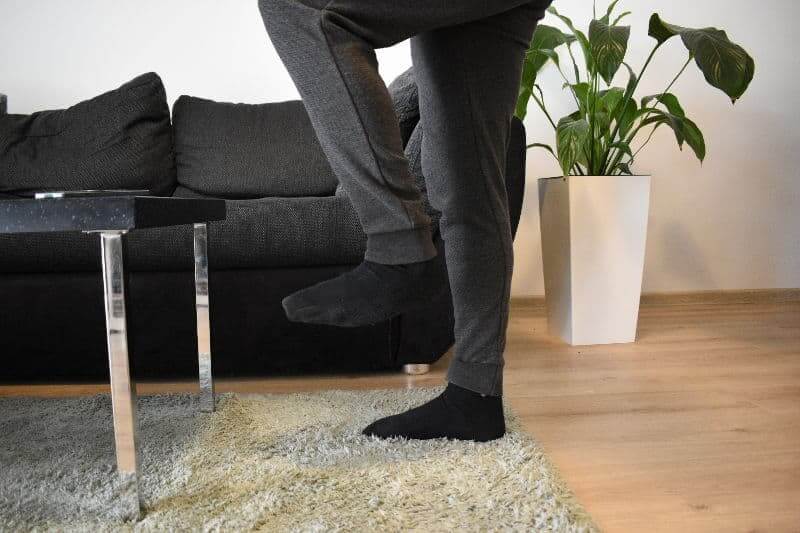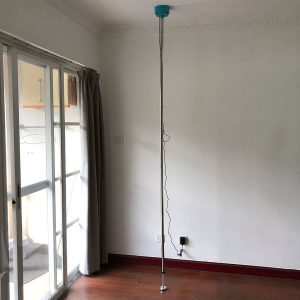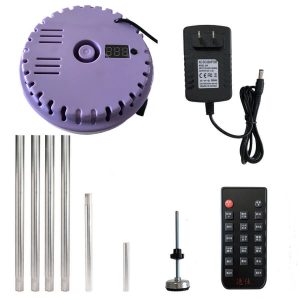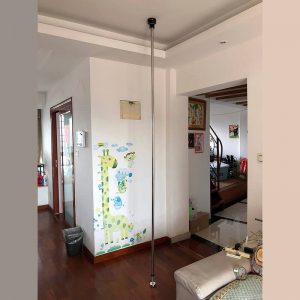Have you ever had the misfortune of living beneath noisy upstairs neighbors? If so, you know how frustrating and disruptive it can be to hear constant stomping and banging on the ceiling.

As someone who has personally dealt with this issue, I know firsthand how important it is to address the problem and find ways to cope. Living in a space that doesn’t provide the peace and quiet you need can take a toll on your mental health, productivity, and overall well-being.
In this blog post, I’ll share some tips and strategies on how to deal with upstairs neighbors stomping and make your living situation more manageable.
10 Ways To Deal With Upstairs Neighbors Stomping
1. Talk to Your Upstairs Neighbors
The first step in dealing with noisy upstairs neighbors is to talk to them. It may seem daunting, but it’s worth a try before taking more drastic measures. Suggest a time to talk to them calmly and respectfully. Explain how their stomping is affecting your peace and quiet, and ask if they can reduce the noise or avoid certain times of the day when it’s particularly bothersome.
It’s important to put yourself in their shoes, too. They might not be aware of the noise they’re making or how it’s affecting you. Think about how you would want to be approached if you were making too much noise. By approaching the situation with empathy and understanding, you may be able to come to a solution together.
2. Put Yourself in Their Shoes
It’s important to consider your upstairs neighbor’s perspective when dealing with noise issues. They might not be aware of how loud they are or how it’s affecting you. They could be dealing with their own problems, like a medical condition or a crying baby.
Try to approach the situation with empathy and understanding. Put yourself in their shoes and think about how you would want to be approached if you were making too much noise. Avoid using accusatory language or getting angry, as this can escalate the situation and make it harder to find a resolution.
Instead, approach them calmly and respectfully. Explain how their noise is affecting you and ask if there’s anything they can do to help reduce it. By showing understanding and a willingness to work together, you may be able to find a solution that works for both of you.
3. Soundproof Your Ceiling
If talking to your upstairs neighbors and addressing their noise habits directly doesn’t work, you may want to consider soundproofing your ceiling. There are several methods to soundproof your ceiling, and you can choose one that works best for your situation and budget.
One of the most effective ways to soundproof your ceiling is by adding mass. This can be achieved by installing a layer of drywall or mass-loaded vinyl to your ceiling. These materials help to absorb sound waves and reduce the amount of noise that travels through the ceiling.
Another way to soundproof your ceiling is by adding insulation. This can help to deaden sound and reduce the amount of noise that travels between floors. Insulation materials like fiberglass batts, cellulose, or spray foam can be installed in the space between your ceiling and your upstairs neighbor’s floor.
Additionally, you can add acoustic panels or soundproof curtains to your ceiling to further absorb sound waves. These materials can be a great option if you’re looking for a temporary or less invasive solution to your noise problem.
Remember that soundproofing your ceiling may not completely eliminate all noise from your upstairs neighbors, but it can certainly help to reduce it significantly.
4. Wear Earplugs or Headphones
One of the simplest and most effective ways to deal with upstairs neighbors stomping is to wear earplugs or noise-canceling headphones. Earplugs can be purchased at any drugstore and are affordable and easy to use. They work by blocking out external noise and can be especially helpful at night when you’re trying to sleep.
Noise-canceling headphones are another great option, especially if you work from home or spend a lot of time in your living space. They work by actively canceling out external noise and can provide a more immersive listening experience.
When using earplugs or headphones, it’s important to use them safely and in moderation. Be sure to take breaks and give your ears a rest, and don’t turn the volume up too loud as this can cause hearing damage.
While wearing earplugs or headphones may not solve the underlying issue of noisy upstairs neighbors, it can certainly help provide some relief and make your living space more manageable.
5. Use White Noise or Nature Sounds
White noise and nature sounds can be an effective way to drown out the sound of upstairs neighbors stomping. White noise is a constant sound that covers up other sounds in the environment, while nature sounds like rain or waves can provide a relaxing background noise.
There are many apps and websites that offer free white noise and natural sound options, or you can purchase a white noise machine. Some machines even offer specific sounds designed to help you sleep or relax, making them a great addition to your bedroom or living space.
When using white noise or nature sounds, it’s important to keep the volume at a safe level and use them in moderation. Using these sounds too loudly or for extended periods of time can cause hearing damage.
White noise and nature sounds can be a great option for those who prefer a more natural approach to noise reduction, and they can be especially helpful for those who have trouble sleeping due to upstairs neighbors stomping.
6. Talk to Your Landlord or Building Management
If you’ve tried all of the previous tips and strategies and the noise from upstairs neighbors is still a persistent issue, it may be time to talk to your landlord or building management. They may be able to help resolve the issue by speaking with your upstairs neighbors, sending a notice or warning, or taking other measures to reduce noise levels.
When talking to your landlord or building management, be sure to provide specific details about the noise and how it’s affecting your quality of life. You can also suggest potential solutions, such as adding insulation or installing carpeting to reduce noise transmission.
It’s important to approach the conversation calmly and professionally and to document any interactions or conversations you have with your landlord or building management. This can be helpful in case further action needs to be taken.
Remember that your landlord or building management has a responsibility to provide tenants with a safe and comfortable living environment, and addressing issues like noisy upstairs neighbors is part of that responsibility.
7. File a Noise Complaint
If talking to your landlord or building management doesn’t lead to a resolution, you may need to file a noise complaint. This can typically be done through your local government or police department.
Before filing a noise complaint, it’s important to keep a record of the times and dates of the noise, as well as any other pertinent details such as the duration and intensity of the noise. This documentation can be helpful in the event that the complaint needs to be escalated.
When filing a noise complaint, be sure to provide as much detail as possible, and be prepared to provide documentation or witness statements if necessary. It’s important to remain calm and professional throughout the process, even if you’re feeling frustrated or upset.
Keep in mind that filing a noise complaint should be a last resort, and it may strain your relationship with your upstairs neighbors or landlord. However, if the noise is significantly affecting your quality of life and other measures have been unsuccessful, it may be necessary to take this step.
8. Use a Ceiling Vibrator for Retaliation
Some people have found success in using a ceiling vibrator as a way to retaliate against noisy upstairs neighbors. A ceiling vibrator is a device that can be attached to the ceiling and used to produce vibrations or shaking, which can be felt by those in the unit above.
Basic Version
-
Product on saleCeiling Vibrator System V2 Version: Remote Control, Vibrating Function, Knocking FunctionOriginal price was: $189.00.$169.00Current price is: $169.00.
Noise Sensor Version
-
Product on saleCeiling Vibrator System V3 Version: Automatic Noise Sensor VersionOriginal price was: $249.00.$189.00Current price is: $189.00.
Best Seller
If you do choose to use a ceiling vibrator, it’s important to do so in a responsible and measured way. Use it sparingly and at appropriate times, such as during the daytime or early evening when noise levels are generally more acceptable. Be prepared for the possibility of a negative response from your upstairs neighbors, and be willing to communicate and try to find a mutually acceptable solution.
9. Move to a Different Unit or Building
If all else fails and the noise from your upstairs neighbors is unbearable and negatively impacting your quality of life, it may be time to consider moving to a different unit or building. This can be a difficult decision, especially if you otherwise like your current space, but sometimes it’s the best option for your mental health and well-being.
Before making the decision to move, consider speaking with your landlord or building management to see if there are any other units available that may be better suited to your needs. They may be willing to work with you to find a solution that doesn’t involve breaking your lease or incurring additional expenses.
If moving to a different unit or building isn’t an option, consider looking for a new living space altogether. Take the time to research neighborhoods, amenities, and building management to ensure that you find a space that meets your needs and provides the peace and quiet you need to thrive.
Remember, dealing with noisy upstairs neighbors can be a frustrating and exhausting experience, but there are steps you can take to alleviate the situation. By using a combination of communication, soundproofing, and self-care techniques, you can create a more comfortable and livable space for yourself.
10. Practice Self-Care
Living with noisy upstairs neighbors can be a stressful and anxiety-inducing experience. That’s why it’s important to prioritize self-care and take steps to manage your stress levels. Here are some self-care techniques you can practice:
1) Take breaks: Give yourself permission to step away from the noise and take a break. Go for a walk, take a nap, or read a book in a quiet corner.
2) Practice mindfulness: Try practicing mindfulness techniques such as deep breathing, meditation, or yoga to help calm your mind and reduce stress.
3) Exercise: Engage in regular physical activity to release tension and improve your overall well-being.
4) Create a peaceful space: Designate a specific area in your home where you can relax and unwind. Decorate it with calming colors and items that bring you joy.
5) Seek support: Talk to friends and family about your experience and how it’s affecting you. Consider seeing a therapist to work through the stress and anxiety caused by the noise.
Remember, self-care is not selfish, it’s essential for your mental health and well-being. By taking care of yourself, you’ll be better equipped to handle the challenges of living with noisy upstairs neighbors.
Conclusion
Living with noisy upstairs neighbors can be a frustrating and stressful experience, but it’s not an unsolvable problem. By using some of the tips and strategies mentioned above, you can create a more peaceful and manageable living situation.
Whether it’s talking to your neighbors, soundproofing your ceiling, or practicing self-care, there are steps you can take to alleviate the impact of the noise.
Remember to approach the situation with empathy and open communication, and prioritize your own mental health and well-being. By taking action and finding ways to cope with the noise, you can create a more harmonious living environment for yourself and your neighbors.



Hi,just wondered how this doesnt break,seen as it has a plastic shell,is it durable,thanks